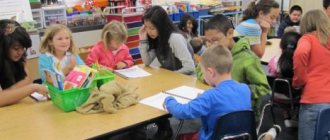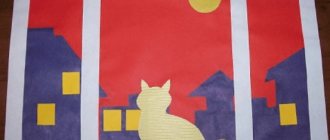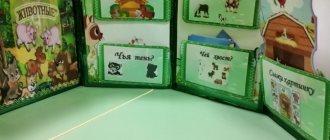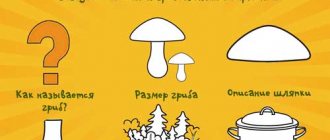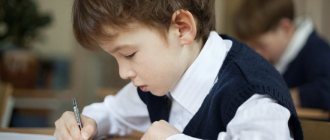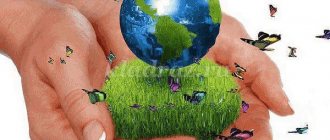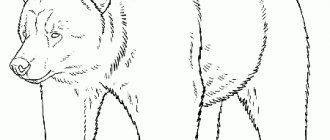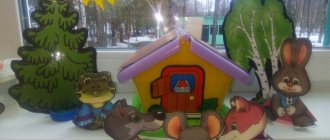"Pets" GCD in the senior group
Author - compiler:
Antipina Natalya Sergeevna
Educator.
MADO kindergarten No. 1 in Tyumen
Summary of integrated educational activities for children of the senior group
Goal: to systematize children’s knowledge and ideas about domestic animals.
Tasks :
Area Cognitive development
To activate and consolidate children's knowledge about pets, their lifestyle, and the benefits of pets for humans.
Establish the relationship and dependence of animal life on humans. To form the concept of “pets”, interest in pets.
Area Speech development
Develop coherent speech and articulatory apparatus.
Sound culture of speech “sound -sh”.
Encourage attempts to express your point of view and seek complete answers. Continue teaching how to solve riddles.
Area Social and communicative development
Develop communication skills, ability to work and play
a team.
Area Physical development
Develop children's motor activity
Equipment and materials:
Demo: “Farm” layout, “Pets” pictures. Handout: Plasticine, board, stack.
Preliminary work: Conversations, examination of illustrations, video films.
Progress of educational activities.
Educator: Close your eyes and listen to the “Voices of Pets.” (Audio recording sounds) What did you hear? How can you call them in one word? Correct – (Pets). And what are they? kind, helpful, necessary. Today we will go to the village, we were invited to visit.
Guess who this is? Emerald eyes, downy fur coat, kind songs, sharp claws. (Cat)
And the cat Vaska has prepared riddles for you, if we guess them, we will find out who he is friends with.
– He is friends with the owner, guards the house, lives under the porch, tail in a ring (children’s answer)
Educator: Guys, guess the following riddles: Well-fed - chews, hungry - moos, gives milk? Did you find out who it is? (children's answer);
In the autumn he climbed into the cabbage, horned and with a long beard. Who is he? (children's answers)
Instead of a nose there is a snout, on his feet there are hooves.
He eats and drinks from a trough. Who is this? (children’s answer);
Educator: Guys! Now we know who Vasily the Cat’s friends are.
It's winter outside and it's very difficult for the animals. Let's bring some treats for the animals.
Do you know what every animal loves?
Didactic game “Where is whose lunch”
(children choose pictures and attach them to the board).
Educator. Results of the game.
Let's walk part of the way like cats. Relaxation game “Evil and Good Cats” (Bend and inflate the back and say –shh)
Educator: Well, we've gained strength and rested! Now let's play sports! The road to the village is covered in snow, how will we get there? (children's answers)
Educator: I agree with you, you can ski! (Children, imitating movements on skis, approach the “Farm” layout
The cat Vasily is sitting on the fence of the farm. The teacher and the guys say hello and give treats to the animals.
Educator: A few thousand years ago, ancient man took the first steps to domesticate wild animals in order to use them for his own purposes. And today it is difficult to imagine our life without pets, as if they have always been faithful companions of people. Initially, man sought to obtain something valuable from animals, providing them with shelter and food.
Pets are animals that have been tamed by humans by caring for them and providing them with food.
Guys, please tell me what benefits do pets bring to us? (children's answers) Who gives milk? (cow, goat) Who lays eggs? (chicken) What is the cat Vaska useful for? (Catches mice) Who guards the house and garden? (dog) Horse? (carries various weights) And from whose wool can you knit socks, mittens, blouses? (sheep, goat, dog). Educator. Guys, do you know where the animals will spend the winter, what the buildings are called? (Cow barn, barn, booth, kennel, corral)
Interesting! Alternative medicine has long noted the ability of animals to heal people. Cats achieve the greatest success in this. Scientists explain the effectiveness of cat therapy by the ability of this animal to create a unique electromagnetic field with low-frequency currents thanks to its thin and soft fur. This allows the cat to act on the source of inflammation and pain and destroy microbes.
Scientists have proven that stroking an animal is not only pleasant, but also useful. Your mood improves.
Pets are roughly divided into two groups.
- The first includes agricultural species used in everyday life and making it possible to obtain natural products and materials. For example, goats and cows provide human food: milk and meat, as well as wool and leather. But horses, despite the emergence of various mechanisms, are still used as labor for transporting goods and as a means of transportation.
- The second group unites all the animals that people keep primarily for communication and leisure. Cats, fish, rodents and dogs are just some of the pets living at home. Such pets, first of all, become full-fledged family members and a person’s friend. They help cope with bad moods, combat loneliness and stress.
A dog has become man's most devoted friend living at home. There is an opinion that, unlike cats, it is more strongly attached to humans.
When deciding to get a dog, you should also know that it needs constant care. Regular walks and feeding are only a small part of care. It is important to immediately decide on the breed, because each has its own characteristics. The character of the animal and what kind of care will be required depend on them.
Guys, Vaska the cat is crying! Why? His dog friend Sharik’s kennel has broken down and he’s sleeping outside in the cold snow! Let's help Sharik! And we'll make him a booth out of plasticine!
Well done! Now Sharik and his friends - stray dogs - will have a place to spend the winter in the cold winter!
And Vaska the Cat wants to play with you! Finger gymnastics “I want to build a house”
I want to build a house so that there is a window in it, so that the house has a door nearby, so that a pine tree grows, so that there is a fence around it, and a dog guards the gate. IN
ICQ says to the children “Thank you”, “Goodbye” Children say goodbye to the animals. Educator: Well, it’s time for us to return to kindergarten. Where are our skis? Let's put it on and go! Educator. Here we are in kindergarten!
where were we? Who did you see? How can you call them in one word? (pets) And they help us a lot! Useful and important!
List of sources used:
1.N.E.Veraxy, T.S. Komarova, M.A. Vasilyeva “Approximate general educational program for preschool education” 3rd edition, revised; Mosaic-Synthesis, Moscow, 2014. 2. M.A. Vasilyeva “Comprehensive lessons according to the program.”
3. L.A. Paramonova “Developmental activities with children”
4.Finger games from the index of finger games.,
5. A.V. Zaporozhets and A.P. Usova – “Game and child development, Psychology, pedagogy of preschooler play”
https://animalsik.com/domashnie-zhivotnyie
https://det-1446-127322.narod.ru/doc.31.html
“Certificate of publication in the media” Series A No. 0004507
We invite teachers of preschool education in the Tyumen region, Yamal-Nenets Autonomous Okrug and Khanty-Mansi Autonomous Okrug-Yugra to publish their teaching materials: - Pedagogical experience, original programs, teaching aids, presentations for classes, electronic games; — Personally developed notes and scenarios of educational activities, projects, master classes (including videos), forms of work with families and teachers.
Why is it profitable to publish with us?
1. “Kindergartens of the Tyumen Region” is an officially registered specialized media outlet at the federal level. 2. The activities of the editorial office are supported by the Department of Education and Science of the Tyumen Region 3. We issue a “Certificate of Publication” in the media. 4. The document has a unique number, is entered in the register, has the original seal of the editorial office of the online publication and signature. 5. “Certificate of publication” in the media is sent to the author in both paper and electronic versions.
Details >>>
Sample “Certificate of publication of author’s methodological material in the media.”pdf
Share

